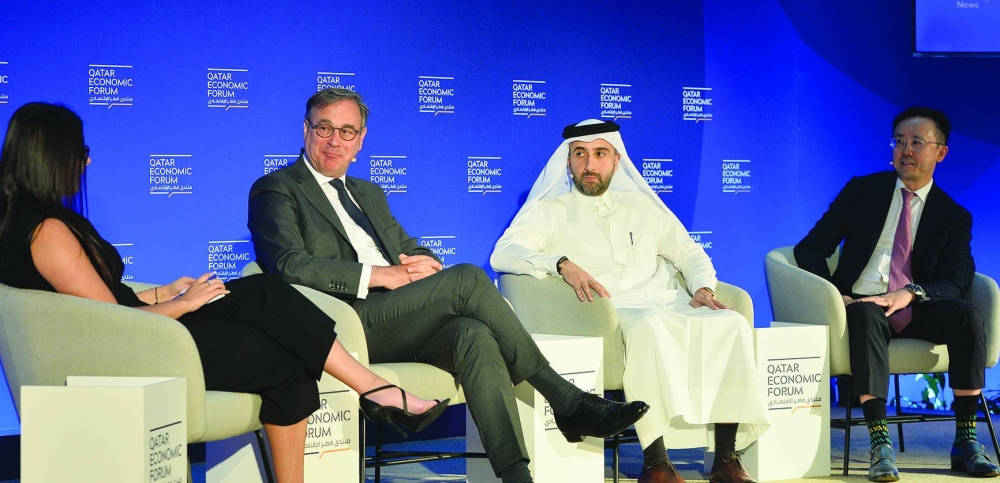A panel of experts underscored the key role of technology in the finance and healthcare industries during a two-part breakout session held Tuesday on the sidelines of the Qatar Economic Forum, Powered by Bloomberg.
Under the theme ‘Global Investment Opportunities in High-Growth Sectors’, the discussion explored how investors are raising the resilience of their portfolios and navigating complexity to take advantage of opportunities in different geographic markets, as well as investments in the healthcare space to understand the role investors play and their long-term impact of their capital.
The first panel comprised Mohamed al-Sowaidi, CIO, Americas, Qatar Investment Authority (QIA); Christophe Bavière, co-CEO, Eurazeo; and Patrick Zhong, founding managing partner, M31 Capital; while the second panel included Christian Angermayer, founder, Apeiron Investment Group; Tasneem Dohadwala, founding partner, Excelestar Ventures; and Dr Mohamed Adel Ghanem, head of Healthcare, QIA.
According to Bavière, the digitalisation of financial institutions is “a very strong trend,” noting that industries related to tech-enabled businesses with the digitalisation of mature businesses are among the important areas of investment in the international market today.
Al-Sowaidi noted that QIA is working on short to medium-term goals, such as dealing with inflation and addressing supply chain issues like those related to the Covid-19 pandemic or monetary policies.
For the long term, al-Sowaidi cited technology industries and other developments in the field of Artificial Intelligence (AI), the evolution of software and hardware, as well as consumer behaviour and winning business models.
“A winning business model and an innovative management team are among the key factors to keep in mind when considering investments,” al-Sowaidi pointed out.
Al-Sowaidi noted that investing in human capital by acquiring the best teams and proximity to markets are two factors that will help a company become a potential investor of choice.
On the other hand, Zhong cited energy transition, demographics, AI, and the reorganisation of the supply chain as some of the most interesting global themes for China, adding that Bloomberg projected that China will add “22.6%” to global growth in the next five years, while the US will add about “11.3%” between 2023 and 2028.
According to Zhong, China made 7mn electric vehicles (EVs) in 2022, representing 60% of the global share, citing BYD Auto, which, he said, has overtaken Tesla in the manufacture of EVs last year.
“China led the transition to renewables; 82% of energy storage produced in the world last year was made by Chinese private companies...of the top five most downloaded apps in the US, four are from China,” he said.
On healthcare, Dohadwala said the increasing degree of how startups are incorporating customer centricity into their early development cycle is among the key trends to look out for, as well as the personalisation of medical devices.
According to Ghanem, other modern breakthroughs in healthcare include the significant drop in the cost of genome sequencing, the massive breakthrough in innovation to understand DNA and its role in addressing ageing and treating diseases, engineering breakthroughs that shorten the time for medical procedures,
AI is also playing a vital role in curating massive amounts of data, enabling better decision-making, he also said.
Angermayer, however, cautioned that despite the advancements in innovation, technology could also have a negative impact on mental health, especially for many young people, stressing the need to find solutions to address these issues, as well.

The first panel comprised Christophe Bavière, co-CEO, Eurazeo; Mohamed al-Sowaidi, CIO, Americas, Qatar Investment Authority (QIA); and Patrick Zhong, founding managing partner, M31 Capital. PICTURE: Shaji Kayamkulam

The second part of the discussion involved experts, such as Christian Angermayer, founder, Apeiron Investment Group; Tasneem Dohadwala, founding partner, Excelestar Ventures; and Dr Mohamed Adel Ghanem, head of Healthcare, QIA. PICTURE: Shaji Kayamkulam

